Last Wednesday 4 December, the Association of Farm & Forestry Contractors in Ireland (FCI) held its 2024 conference at the Killeshin Hotel, Portlaoise.
The theme of this year’s event was ‘Farm Contracting Meeting New Challenges’ and was attended by 130 contractors from all over Ireland. In a similar format to last year’s, the Minister of Agriculture Charlie McConalogue was in attendance, where he addressed the room and recognised the importance of a viable and professional contracting service for the farmers, which he described as fundamental to delivery of the economic and environmental goals of the Irish agricultural sector.
At the conference, the minister announced a new Sustainable Forestry Harvesting Machinery Grant, to provide support to forestry contractors and timber hauliers for the purchase of new forest machinery to optimise environmental performance.
“The Sustainable Forestry Harvesting Machinery Grant will also offer innovative forest machinery solutions for the clearance and extraction of trees on reconstitution sites, such as those impacted by the ash dieback disease,” he said.
Bearing in mind, the conference was predominately attended by FCI’s farm contractor members, the announcement, which although is a step in the right direction for the forestry sector, was met with a sense of discontent and a further sense of exclusion.
This and the ongoing exclusion of farm contractors from TAMS funding, carbon tax rebate and the increasing costs of doing business were the major concerns voiced to the minister. In his response, the minister explained:
“I think there is real logic in relation to supporting contractors. Contractors in their own right play a massive role, and an increasingly important role in terms of providing services to farmers. I think its something that we have to look at and see what we can do here. But it is going to require a register in order to be an enabler.
“I’d certainly be keen to see that develop. It’s certainly something I am keen to explore in terms of what we can do surrounding TAMS grants,” the minister outlined.
Recognition
FCI research director, Michael Moroney recognised the minister’s announcement of machinery grant aid for forestry contractors, but expressed disappointment as to why the agricultural contracting sector was left out, considering the similarities of both sectors.
Challenging the minister, Moroney said: “We (FCI) will work with you to look at the criteria and eligibility criteria for the forestry machinery grants and hope that you can convert that to a grant aid programme to suit the agricultural contractors.”
In response, the minister said: “I think it shows that we want to try and do something here. There is the complication in relation to how we manage and administer it, and we just have to manage and work our way through that with you to see how we can have a system that will stand up and work well for contractors and be workable and verified.
“Let’s step it out and see how we can do that, but I think the fact we are moving in that direction shows that it is something we have an appetite for. There is so much logic to it, we just need to find a way to do it.”
During his opening presentation, Moroney highlighted that the Irish contracting sector now accounts for €990m in turnover annually.
On the other hand, machinery depreciation costs at farm level have risen by 110% during 2023, which can be largely accounted to TAMS grant aid.
Although there is more machinery present on farms, contractor services as a percentage, have stayed steady at 14% of overhead costs on Irish farms.
As a result of high machinery operating costs, the FCI has increased the rates on its contractor charges guide by a further 5% for 2025. The FCI outlined that diesel costs have risen by 30%, machinery costs by 80%, parts by more than 100%, tyres by 50% and AdBlue by over 50%.
Moroney concluded by highlighting the need for contractors to examine their individual operational costs and not to set rates dependant on the competition.
He also said that efficiency improvements should be made where possible, ie reduce engine idle times, etc.
Visitors were also treated to five guest speakers, covering all the latest challenges, opportunities and changes coming down the line, and last but not least, the importance of promoting good mental health.
One of these presentations detailed the news we brought to you last week, regarding the requirement of dual-line hydraulic brakes on all new tractors from 1 January 2025.

The conference was attended by by 130 agricultural contractors from all across Ireland. \ Alf Harvey
Increased use of protected urea presents challenges
Protected urea has been a contentious topic throughout 2024, with many claiming issues with striping and quality this year. Dermot Forristal of Teasgac Oak Park provided an insightful update on the topic, covering areas such as why as an industry we need to stick with it, its characteristics and what to be mindful of, as well as why correct spreader calibration and setup is more important than ever for an accurate urea application.
Dermot outlined the importance of choosing a product with good physical characteristics, ie large, rounded granules (80% between 2-4mm, smooth and strong). He also highlighted the importance of good practice surrounding the storage of protected urea and how both storage and product age can affect flow rates. In addition, he encouraged those who handle fertiliser to be mindful of the date when inhibitor was applied, as it does have a limited shelf life.
Regarding the spreader itself, Dermot highlighted the importance of selecting a spreader with a good spread pattern, correctly setting discs, vanes, fertiliser drop position and setting resources, ie apps, shake tester, crush tester, etc.
Dermot concluded his presentation by outlining that protected urea is the best solution available for greenhouse gas emissions, but that users need to consider particle strength and size distribution, all while being aware of its limitations, ie limit bout widths based on test hall results, spread lower-quality product at narrower bout widths and tray-test as appropriate.
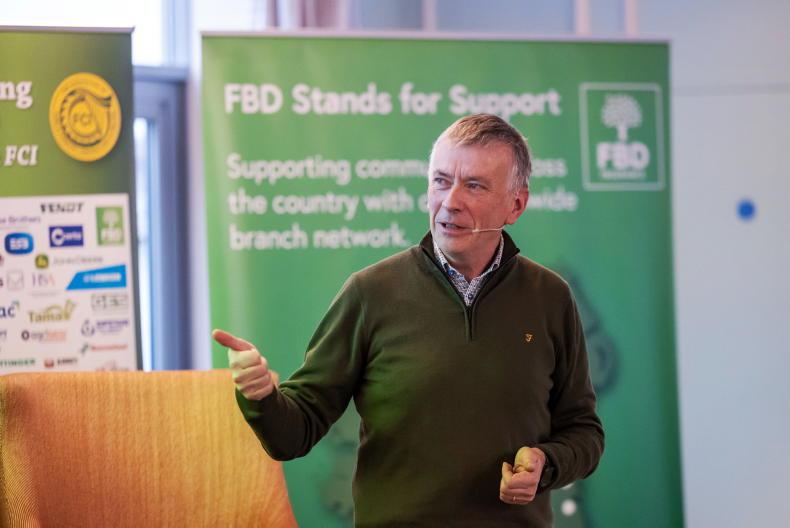
Dermot Forristal of Teagasc Oakpark gave an insightful update on the topic of protected urea. \ Alf Harvey
How contractors can help deliver sustainable hedgerows
Dr Alan Moore of Hedgerows Ireland gave an overview on how contractors can help to deliver more sustainable hedgerows while hedge cutting.
Having highlighted the role and importance of hedgerows within the Irish landscape, Alan discussed the benefit of marginally increasing hedgerow height and width.
He used an example of a hedge measuring 1.5m high x 3m wide, versus a hedge measuring 2m x 3.5m.
The smaller of the two has the ability to store 0.27 mega tonnes of carbon, while the slightly larger hedge has a five-fold increase in its carbon storage ability, at 1.4 mega tonnes.
Some of Alan’s advice on the day included: cutting the hedge in an ‘A’ shape as opposed to a ‘box’ shape, encouraging rotational cutting where possible and trying to avoid cutting to the previous growing point, as over time this will encourage disease or death of the hedge.
Challenges put forward from the floor included the management of debris as a result of rotational cutting, now that the burning of green waste is no longer permitted.
Another was the degree of abuse and confrontation from the general public that contractors now fall victim to when cutting hedges out of season for safety reasons along roads where visibility is restricted.
In his response, Alan agreed that there is a broad lack of understanding regarding the the cutting of hedges out of seasons for safety reasons under the road safety act.
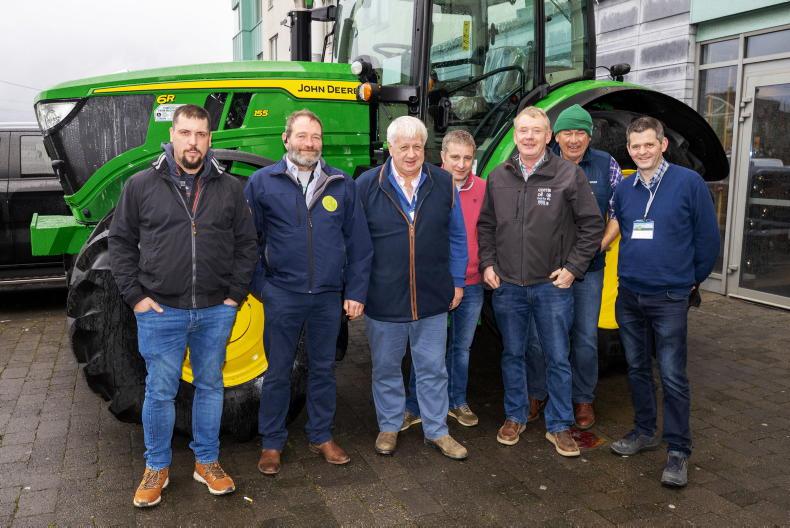
Keith Hanrahan, Birr Norman Egar, Kildare; Roger Perry, Athy; Michael Quigley, Kildangan; John Bailey, Wexford; James Graham, Gorey and John Drennan, Cullohill.
Picture: Alf Harvey.
Slurry separation solutions
Slurry separation is a topic we at the Irish Farmers Journal have covered on a number of occasions. However, David Whelehan of Vogelsang Ireland provided an insight into the process and the mobile solutions available from Vogelsang to help both the farmer reduce his/her slurry storage requirements and the contractor to expand the range of services provided. Aimed towards the contractor or farmers separating slurry on multiple sites, the German manufacturer offers its XSplit mobile, trailer-mounted solution. This unit offers an output capacity of up to 50m3/hr, which is said to be more realistically around 40m3 in typical Irish slurry, where there are high levels of fibre. The TAMS III grant eligible solution markets itself as being able to offer up to 20% more storage in holding tanks, while offering a concentrated liquid solution that can be applied to grass swards or crops without the same risk of leaf contamination found with unseperated slurry. For more on slurry seperation, check out farmersjournal.ie.

Maeve Burke, Newmarket on Fergus; Neilus O’Connor, Listowel; Kevin Burke, Newmarket on Fergus and Thomas Sheehy, Listowel. \ Alf Harvey.
Stress and mental health management
Finola Colgan of Mental Health Ireland highlighted the importance of maintaining good mental health. She said that farmers and contractors work in an isolated environment and, therefore, it can be harder to reach out.
“They are the first to call out a vet if an animal is sick, or fix a machine, but they often don’t give themselves the time they need, or look after themselves,” Finola explained. ”Bad days will occur, but the important thing is not to let it take over, talking and seeking support are both really important, along with practising quality downtime in order to reset and return with a fresh approach,” she said. A good phrase used by Finola, which she believes is important, is to remember that “mental health is not mental illness”. All the necessary resources and advice discussed within the presentation are available on the Mental Health Ireland website and www.Farmres.eu.
Rail crossing awareness
Frank Golden from Irish Rail gave an informative presentation surrounding rail crossing awareness, particularly crossings that intersect within farming communities. Throughout the 2,400km Irish network, there are a total of 880 level crossings and 5,000 bridges. One of Frank’s points of focus was in relation to level crossings, particularly those that are unattended. These are the highest risk, he said and road users need to be aware that the onus is on them to take responsibility when it comes to opening and closing the gates. When given 48 hours’ notice, Iarnród Éireann do provide a free protection service, whereby the crossing will be manned during operations such as silage. He also discussed real-life examples of barrier strikes, of which there were 120 in 2023, alongside an increasing number of red-light violations.
Frank concluded by outlining the safety enhancements being implemented across all public level crossings, which include new warning lights, warning signs and surface markings.
Last Wednesday 4 December, the Association of Farm & Forestry Contractors in Ireland (FCI) held its 2024 conference at the Killeshin Hotel, Portlaoise.
The theme of this year’s event was ‘Farm Contracting Meeting New Challenges’ and was attended by 130 contractors from all over Ireland. In a similar format to last year’s, the Minister of Agriculture Charlie McConalogue was in attendance, where he addressed the room and recognised the importance of a viable and professional contracting service for the farmers, which he described as fundamental to delivery of the economic and environmental goals of the Irish agricultural sector.
At the conference, the minister announced a new Sustainable Forestry Harvesting Machinery Grant, to provide support to forestry contractors and timber hauliers for the purchase of new forest machinery to optimise environmental performance.
“The Sustainable Forestry Harvesting Machinery Grant will also offer innovative forest machinery solutions for the clearance and extraction of trees on reconstitution sites, such as those impacted by the ash dieback disease,” he said.
Bearing in mind, the conference was predominately attended by FCI’s farm contractor members, the announcement, which although is a step in the right direction for the forestry sector, was met with a sense of discontent and a further sense of exclusion.
This and the ongoing exclusion of farm contractors from TAMS funding, carbon tax rebate and the increasing costs of doing business were the major concerns voiced to the minister. In his response, the minister explained:
“I think there is real logic in relation to supporting contractors. Contractors in their own right play a massive role, and an increasingly important role in terms of providing services to farmers. I think its something that we have to look at and see what we can do here. But it is going to require a register in order to be an enabler.
“I’d certainly be keen to see that develop. It’s certainly something I am keen to explore in terms of what we can do surrounding TAMS grants,” the minister outlined.
Recognition
FCI research director, Michael Moroney recognised the minister’s announcement of machinery grant aid for forestry contractors, but expressed disappointment as to why the agricultural contracting sector was left out, considering the similarities of both sectors.
Challenging the minister, Moroney said: “We (FCI) will work with you to look at the criteria and eligibility criteria for the forestry machinery grants and hope that you can convert that to a grant aid programme to suit the agricultural contractors.”
In response, the minister said: “I think it shows that we want to try and do something here. There is the complication in relation to how we manage and administer it, and we just have to manage and work our way through that with you to see how we can have a system that will stand up and work well for contractors and be workable and verified.
“Let’s step it out and see how we can do that, but I think the fact we are moving in that direction shows that it is something we have an appetite for. There is so much logic to it, we just need to find a way to do it.”
During his opening presentation, Moroney highlighted that the Irish contracting sector now accounts for €990m in turnover annually.
On the other hand, machinery depreciation costs at farm level have risen by 110% during 2023, which can be largely accounted to TAMS grant aid.
Although there is more machinery present on farms, contractor services as a percentage, have stayed steady at 14% of overhead costs on Irish farms.
As a result of high machinery operating costs, the FCI has increased the rates on its contractor charges guide by a further 5% for 2025. The FCI outlined that diesel costs have risen by 30%, machinery costs by 80%, parts by more than 100%, tyres by 50% and AdBlue by over 50%.
Moroney concluded by highlighting the need for contractors to examine their individual operational costs and not to set rates dependant on the competition.
He also said that efficiency improvements should be made where possible, ie reduce engine idle times, etc.
Visitors were also treated to five guest speakers, covering all the latest challenges, opportunities and changes coming down the line, and last but not least, the importance of promoting good mental health.
One of these presentations detailed the news we brought to you last week, regarding the requirement of dual-line hydraulic brakes on all new tractors from 1 January 2025.

The conference was attended by by 130 agricultural contractors from all across Ireland. \ Alf Harvey
Increased use of protected urea presents challenges
Protected urea has been a contentious topic throughout 2024, with many claiming issues with striping and quality this year. Dermot Forristal of Teasgac Oak Park provided an insightful update on the topic, covering areas such as why as an industry we need to stick with it, its characteristics and what to be mindful of, as well as why correct spreader calibration and setup is more important than ever for an accurate urea application.
Dermot outlined the importance of choosing a product with good physical characteristics, ie large, rounded granules (80% between 2-4mm, smooth and strong). He also highlighted the importance of good practice surrounding the storage of protected urea and how both storage and product age can affect flow rates. In addition, he encouraged those who handle fertiliser to be mindful of the date when inhibitor was applied, as it does have a limited shelf life.
Regarding the spreader itself, Dermot highlighted the importance of selecting a spreader with a good spread pattern, correctly setting discs, vanes, fertiliser drop position and setting resources, ie apps, shake tester, crush tester, etc.
Dermot concluded his presentation by outlining that protected urea is the best solution available for greenhouse gas emissions, but that users need to consider particle strength and size distribution, all while being aware of its limitations, ie limit bout widths based on test hall results, spread lower-quality product at narrower bout widths and tray-test as appropriate.

Dermot Forristal of Teagasc Oakpark gave an insightful update on the topic of protected urea. \ Alf Harvey
How contractors can help deliver sustainable hedgerows
Dr Alan Moore of Hedgerows Ireland gave an overview on how contractors can help to deliver more sustainable hedgerows while hedge cutting.
Having highlighted the role and importance of hedgerows within the Irish landscape, Alan discussed the benefit of marginally increasing hedgerow height and width.
He used an example of a hedge measuring 1.5m high x 3m wide, versus a hedge measuring 2m x 3.5m.
The smaller of the two has the ability to store 0.27 mega tonnes of carbon, while the slightly larger hedge has a five-fold increase in its carbon storage ability, at 1.4 mega tonnes.
Some of Alan’s advice on the day included: cutting the hedge in an ‘A’ shape as opposed to a ‘box’ shape, encouraging rotational cutting where possible and trying to avoid cutting to the previous growing point, as over time this will encourage disease or death of the hedge.
Challenges put forward from the floor included the management of debris as a result of rotational cutting, now that the burning of green waste is no longer permitted.
Another was the degree of abuse and confrontation from the general public that contractors now fall victim to when cutting hedges out of season for safety reasons along roads where visibility is restricted.
In his response, Alan agreed that there is a broad lack of understanding regarding the the cutting of hedges out of seasons for safety reasons under the road safety act.

Keith Hanrahan, Birr Norman Egar, Kildare; Roger Perry, Athy; Michael Quigley, Kildangan; John Bailey, Wexford; James Graham, Gorey and John Drennan, Cullohill.
Picture: Alf Harvey.
Slurry separation solutions
Slurry separation is a topic we at the Irish Farmers Journal have covered on a number of occasions. However, David Whelehan of Vogelsang Ireland provided an insight into the process and the mobile solutions available from Vogelsang to help both the farmer reduce his/her slurry storage requirements and the contractor to expand the range of services provided. Aimed towards the contractor or farmers separating slurry on multiple sites, the German manufacturer offers its XSplit mobile, trailer-mounted solution. This unit offers an output capacity of up to 50m3/hr, which is said to be more realistically around 40m3 in typical Irish slurry, where there are high levels of fibre. The TAMS III grant eligible solution markets itself as being able to offer up to 20% more storage in holding tanks, while offering a concentrated liquid solution that can be applied to grass swards or crops without the same risk of leaf contamination found with unseperated slurry. For more on slurry seperation, check out farmersjournal.ie.

Maeve Burke, Newmarket on Fergus; Neilus O’Connor, Listowel; Kevin Burke, Newmarket on Fergus and Thomas Sheehy, Listowel. \ Alf Harvey.
Stress and mental health management
Finola Colgan of Mental Health Ireland highlighted the importance of maintaining good mental health. She said that farmers and contractors work in an isolated environment and, therefore, it can be harder to reach out.
“They are the first to call out a vet if an animal is sick, or fix a machine, but they often don’t give themselves the time they need, or look after themselves,” Finola explained. ”Bad days will occur, but the important thing is not to let it take over, talking and seeking support are both really important, along with practising quality downtime in order to reset and return with a fresh approach,” she said. A good phrase used by Finola, which she believes is important, is to remember that “mental health is not mental illness”. All the necessary resources and advice discussed within the presentation are available on the Mental Health Ireland website and www.Farmres.eu.
Rail crossing awareness
Frank Golden from Irish Rail gave an informative presentation surrounding rail crossing awareness, particularly crossings that intersect within farming communities. Throughout the 2,400km Irish network, there are a total of 880 level crossings and 5,000 bridges. One of Frank’s points of focus was in relation to level crossings, particularly those that are unattended. These are the highest risk, he said and road users need to be aware that the onus is on them to take responsibility when it comes to opening and closing the gates. When given 48 hours’ notice, Iarnród Éireann do provide a free protection service, whereby the crossing will be manned during operations such as silage. He also discussed real-life examples of barrier strikes, of which there were 120 in 2023, alongside an increasing number of red-light violations.
Frank concluded by outlining the safety enhancements being implemented across all public level crossings, which include new warning lights, warning signs and surface markings.








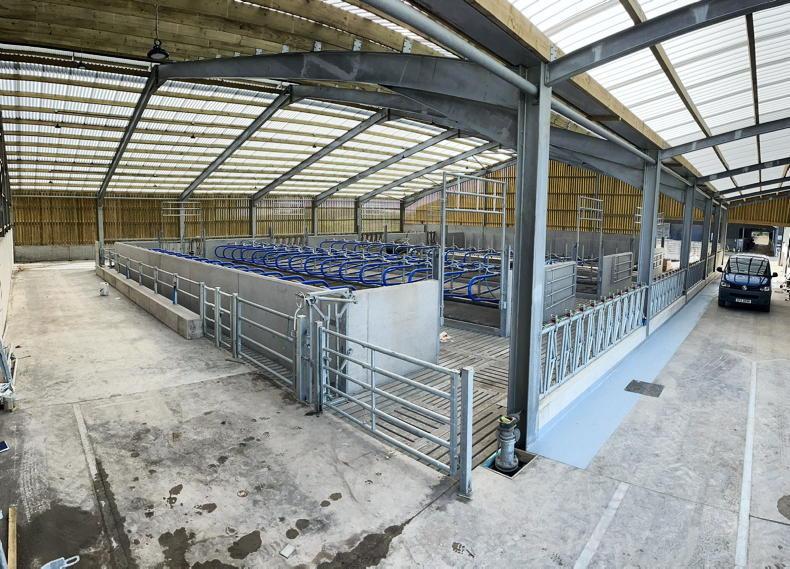

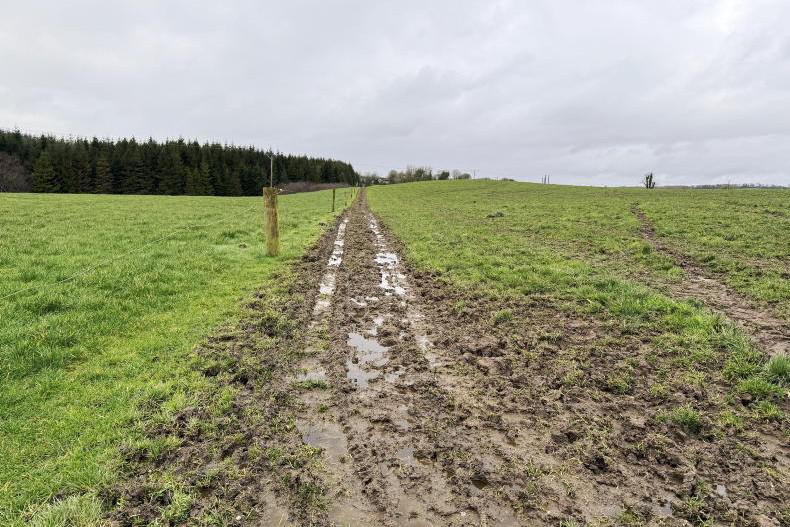
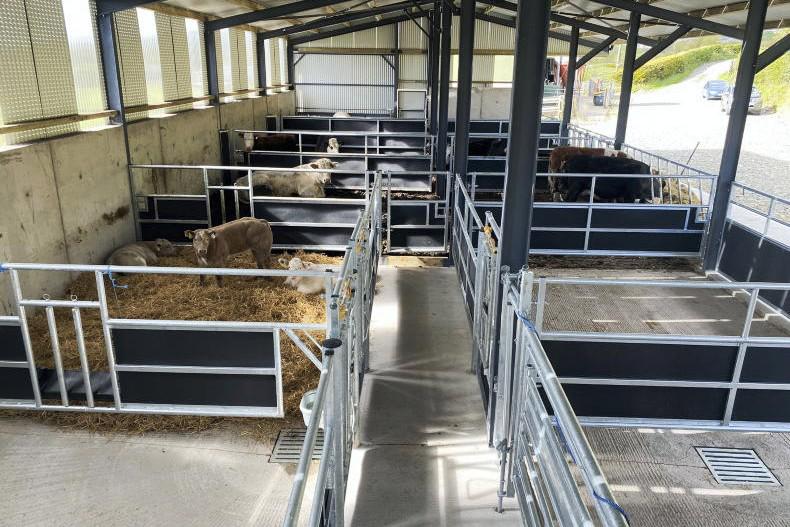
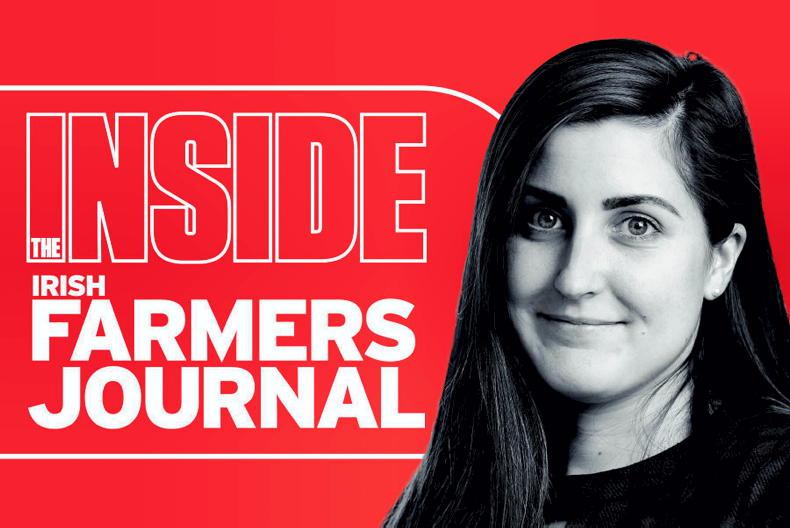
SHARING OPTIONS